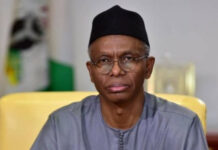By Richard Dirim Odu, 08033374378
Governor Anayo Rochas Okorocha of Imo State shut critics up late last year when he distributed cheques to undergraduates in the state’s tertiary institutions to make good his administration’s promise of free education up to the university level. With that, he demonstrated his unquenchable passion to give the youth a good start in life and relieve parents of some burden.
Critics and friends of the administration had watched with dismay at the commencement of the project which they felt was gigantic and fund guzzling, and so was not realisable. Some reasoned that education was already free at the primary and junior secondary levels, courtesy of the Federal government and so the state government should refrain from taking undue glory.
Viewing from another side of the prism, one cannot but admit that at no time had the need to take advantage of the free education policy been more emphasized than now. To that extent, if nothing else, the administration should get credit as previous administrations had, despite playing down the policy, charged parents some fees from the backdoor.
In all probability, the literacy level of the state, already adjudged the hub of education in the federation, is about to rise astronomically following the development. Indigent students can then consider their days of anguish over.
A few utterances and policy somersaults have, however, given the impression that the scheme was not properly laid out on the drawing board before it took off, especially as it concerns the tertiary level. The rumour mill fed fat and a well intentioned scheme was threatened following the various changes and initial hiccups. For instance, an earlier announcement was that the scheme would not include non-indigenes. Later on, government came out saying that they would be involved to the tune of 50 per cent. It is normal for government to change directions at times for cogent reasons, but when the frequency of these changes begins to appear ridiculous, eyebrows are raised.
Having distributed cheques to the tune of N100, 000 to the students, payable to banks into the university’s coffers, government can be seen as having officially raised the fees in the state’s university to that amount. Same applies to the polytechnics and other institutions where students got cheques for various amounts.
Soon after, the Imo State University acting Vice Chancellor, Prof Ukachukwu Awuzie, came on air to clarify that the N100,000 was for tuition and that students were required to pay additional N20,000 into the banks. That brings the total fees to N120,000. In other words, if government ceases to pay the N100,000 which appears in this circumstance to be a subsidy, the student would be required to pay N120,000. This is besides rents for accommodation not provided in the university, books which they compulsorily buy because lecturers tie their assignments to their books, and other sundry charges in the departments.
However, the figure may be double what was obtainable prior to the introduction of the free education, but the students still go home with some change.
Part of the rumour that circulated at the onset was that the N100,000 per student was to replace the regular government subvention for IMSU. If it was intended to be that way, one is tempted to ask questions whether the scheme is a scholarship, a bursary, a subsidy or truly the free education that it has been said to be. Again, one is forced to consider, between free education, scholarship and bursary, the scheme that benefits the society more. Had we been in the 19th century when industries and government departments yearned for educated personnel, or had Imo been grouped among the educationally disadvantaged states where children are coaxed into going to school, free education would have been a perfect idea.
Quite on the contrary, Imo has sufficient appetite for education and indeed is at present battling with a glut in manpower that desperately mills around the job market in search of employment. The prayer today is that a free education would not compound the problem. At the moment, no visible efforts have been made by government to provide enabling environment to boost entrepreneurship and so improve upon the employment situation. Then the question; after free education, what next? Granted that education ought to make someone a job creator, but we must also realize that a seed germinates only when the conditions are favourable to its survival.
It does appear, therefore, that the major problem confronting the youth in Imo State is primarily not education or how to pay through school but life after education. An average Imo man feels proud to pay his children’s fees. What he particularly yearns for is a qualitative education as well as his ward’s ability to get established on finishing school.
Here then, we consider the quality of education that we are to get. Beyond political talks of having provided everything the child needs and having staffed every school with qualified teachers, it is pertinent to get acquainted with the realities on ground. As expected, the population of the public schools burgeoned with the pronouncement of the free education. Those who were in private schools moved over quickly to enjoy the national, nay, rescue mission cake, such that infrastructure have been stretched beyond limits and teachers tasked above their capabilities. Make no mistake about it, even the dunces among them rushed into the classrooms just because education has been declared free. The government then found itself struggling to meet up, to the detriment of other sectors like health, sports, youth empowerment, etc. The income of public servants is heavily taxed just for the state to be able to fund education. The entire affair then appears like robbing Peter to pay Paul.
Here again, we examine a situation where the working class, the same parents and others who may not have been married let alone have children in school, are taxed. In such a situation, it may not be completely true to say that education is free. Some people somewhere are paying for it and courtesy demands that they should also share in the glory.
The impression is created that the rescue mission is tilting too heavily to education while the health and sports sectors are left orphans that must fend for themselves under the commercialization policy. Some have quipped that only a healthy person goes to school.
Couldn’t scholarships, where students compete for positions, have helped to bring out the best from our greater-tomorrows? Couldn’t bursary have been considered so that students of Imo origin could get some money for their sundry needs while the parents pay school fees?
The dimension that added a N100 stipend for pupils makes us look like the northerners where children are begged to go to school. What will N100 do for the pupil in one month when it is known that such an amount can only fetch two balls of akara and no pure water to wash it down with? Are we aware that we created avenue for fraud as there are no records of disbursement and so accounting is made difficult? It would only breed millionaires from officials responsible.
With the exodus of school children from private schools to public ones, the stage is set for a lull in the private school enterprise. Technically, those engaged in running private schools are worse off. In some communities where schools were returned to the missions, a feud has developed between the missions and the communities who felt that their children would be denied the chance to benefit from the free education since the scheme does not extend to private schools. In other words, those who may have dreamt of entrepreneurship in the area of education have been checkmated and their dreams dashed.
Did the government, at the onset, plan for the sustainability of the project for at least four to six years during which a batch of tertiary institution beneficiaries of the scheme may have passed out and become fully fledged graduates in their various fields? If this is not achieved it would be disastrous what we turn out in future as educated persons.
This is not meant to paint the scheme black or condemn it in its totality, but to call for a fine-tuning so that at the end of the day, everyone benefits.











